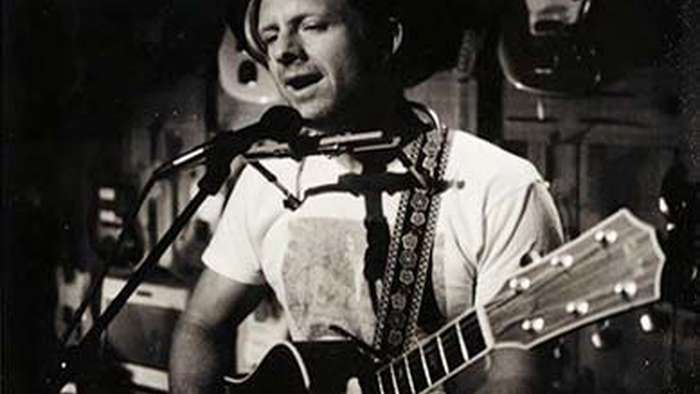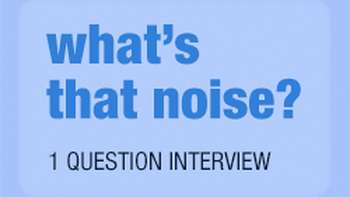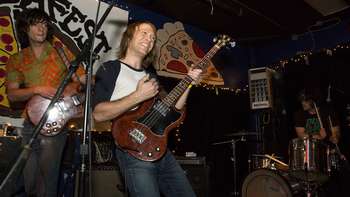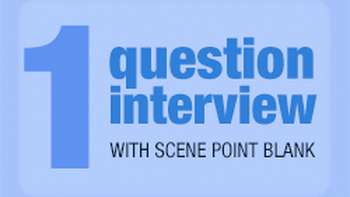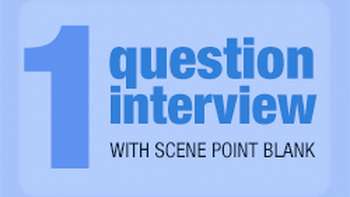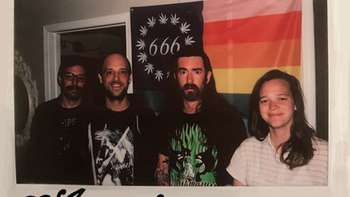Writing 24 songs to correspond with the 24 hours of the day is an ambitious plan in anyone's eyes, but combined with fronting the Grammy Award-winning rock band Switchfoot, and starring in a film centring on the touring life of said band, makes it seem like a gargantuan task. The Wonderlands, a staggered release of four EPs all relevant to different points in the day (Dawn, Sunlight, Darkness, Shadows) sees Jon craft the acoustic, toned-down music he favours on his solo output with a fluidity that gives the impression of the movement of time. SPB asked Jon about how deep the existence of The Wonderlands goes, what it was like to be filmed for Fading West, his views on the American media and, pertinently, his 3-year old daughter's system for deducting whether one of his songs should be kept, or reworked.
Scene Point Blank: You studied economics at university before you dropped out to pursue music full-time with Switchfoot, can you remember how it felt to make that decision?
Jon Foreman: I made an album in college with a band called Etc., then that broke up and then I did a four-track demo under the name Chin Up and made a couple records under the name Switchfoot. We'd done a couple of tours and all that, but it was just getting to the point where I was trying to talk my professors into letting me take tests on the road. Nowadays you can continue your education online but this was way before that. I remember making that decision where I thought, you know, I could always come back to college but this is my one chance to really try the music thing out.
Scene Point Blank: When you begin writing songs do you write them with the sole intention of them being just for Switchfoot or just for your solo work or do they mix and then you decide?
Jon Foreman: I try to write songs just for the song itself. I don't try and think about where it's going to end up, that way you're writing for the good of the song. That's always been our motto at Switchfoot, at Fiction Family, solo or whatever: for the good of the song. That feels like then you're not trying to fit it into a box from the beginning. Certainly production, down the line, you want songs to sound cohesive with the other songs on the record but when you first start writing you just want to write to tell the truth.
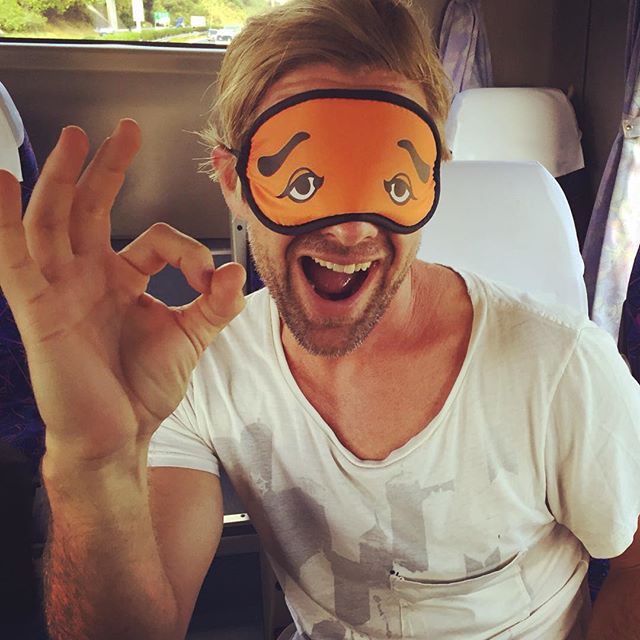
Scene Point Blank: What was the experience of being filmed for Fading West like?
Jon Foreman: I'm not really one to be on camera, I'd rather be writing songs.
Scene Point Blank: I think that helped it, though. When I saw it I didn't get the impression that anyone in Switchfoot was acting like a film star or anything, and I think that made it more endearing because you were just being normal people.
Jon Foreman: [Laughs] I'm glad. Definitely, the trick there is you want to capture real life, but then the other side of it is that you don't really want to give too much of yourself away to the camera, so that's the balance of it.
Scene Point Blank: And when you were working on the Fading West album did you feel more pressure than on your other albums because you had released a film tied to it?
Jon Foreman: Yeah, there were a lot of strings attached. You're trying to write songs for the soundtrack to a film, you're trying to figure out how to make an album that's completely unlike anything you've ever done. It was a very challenging period, but I'm really proud of where I ended up and glad to be on the other side.
Scene Point Blank: The Wonderlands is your second collection of EPs, I was wondering what prompts you to release collections of EPs instead of a single EP or an album?
Jon Foreman: I love the idea that you can create a world through song and cultivate these stories that are a little bit bigger than just an album. I love staggering the release of EPs, it feels like you're telling a story one step at a time. There's something beautiful about putting out 24 songs, but there's something overwhelming about it as a listener. So I felt like the EP concept, and staggering the release, felt like a perfect way to do both. You can tell a bigger story, but you're also allowing the details to set in as well.
Scene Point Blank: Do you get your daughter's seal of approval before you put out new music?
Jon Foreman: [Laughs] She's very opinionated. We just recently started playing a game called 'thumbs up or thumbs down', where I play her a song and she thumbs up or thumbs down. The beautiful thing is that she means no harm. If adults played that game you'd be aware of feelings and not wanting to hurt somebody's feelings and trying to play something politically correct, but with a 3 year old she just thumbs up - I like it, thumbs down - I don't like it.
Scene Point Blank: Is it majority thumbs up then?
Jon Foreman: Most of the time thumbs up, some of the time she does not like it.
Scene Point Blank: A discerning critic!
Jon Foreman: Which is great, I love that she's got an opinion. Yeah, she's not me and I'm not her. Never will it be.
Scene Point Blank: There's a lyric in "Terminal" where you sing "Some folks die in offices one day at a time" and it really struck me, have you ever felt like that or did that lyric come from looking at people around you?
Jon Foreman: I've never really had a desk job, but I've died one day at a time all over the place. I usually write from my own experience, and that's definitely a true statement for me. I think having a song about desiring to live and wanting to get it right, which many of my songs do, often I have to clarify that I haven't figured it out yet.
Scene Point Blank: Still in the midst of an existential crisis or something?
Jon Foreman: Yeah, still trying to figure out what it means to be human and to be living life to the full and to be following Christ. You know, all of these statements, they aren't periods at the end of the sentence, they're the middle of the sentence where you're looking for the next step.
Scene Point Blank: I think comes across in the stuff you write for The Huffington Post as well, there's a lot of stuff in there that's philosophical but it's really good to read it because it's like being on a journey, as clichéd as that sounds, when you read it. It's good to know everyone feels sort of lost.
Jon Foreman: Yeah, and I think the beauty isn't in that as being the final statement, but the idea that life is not a destination. The meaning of life isn't found in the conclusion, maybe, because the conclusion for all of us is the grave. Whereas the questions in the journey, in the struggle and in the fight, that's where life is found and that gives me hope. A friend of mine interviewed this family of tightrope walkers, they perform with different circuses, and it's a skill that they passed on from generation to generation. The father was talking about balance, and he was saying balance isn't something you achieve, that you grab onto and put into your back pocket, but balance is rather about putting one foot in front of the other, compensating and walking forward with your eye on the horizon and compensating for what's happening at the time. So you're always adjusting, always moving forward. And that for me was really helpful, because I think your balance changes throughout life. You figure out a balance for one situation, and then suddenly you're married and now you need a new set of ropes [Laughs]. Or you have children, or your children get older, or you get older. I mean that's what life is, a continual state of journey. You are a river passing downstream.
"I mean that's what life is, a continual state of journey. You are a river passing downstream."
Scene Point Blank: Always in flux.
Jon Foreman: Yeah, always in flux, that's right. I think that's one of the reasons why I love music.
Scene Point Blank: I find "Thrive" is a song constantly go back to because it's kind of hopeful.
Jon Foreman: Yeah, I like that one too. There was a kid who wanted me to write it down in my handwriting because he wanted to get it tattooed, so I just posted that online this morning. So it's very fitting that you'd bring that song up.
Scene Point Blank: How does it feel to know that people are getting your lyrics and your handwriting tattooed on themselves?
Jon Foreman: It's pretty wild. On the one hand it's strange, but on the other hand it feels like you're all part of the same story and there's a thread that's joining everything together. I like that element, the community element.
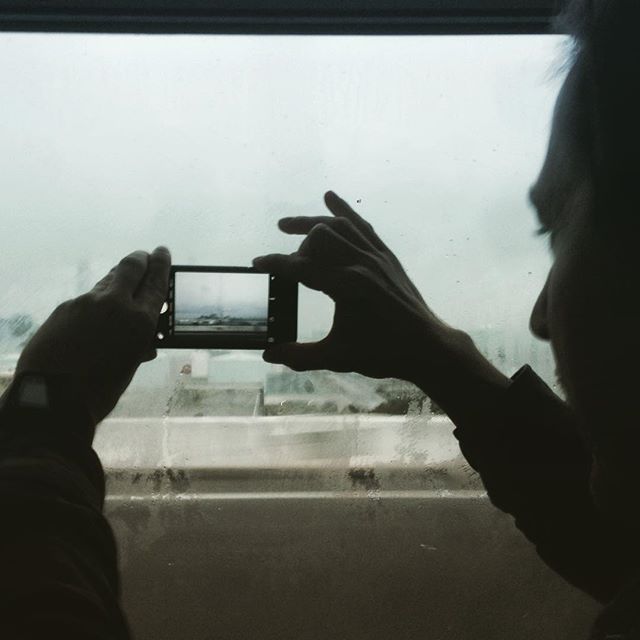
Scene Point Blank: I've noticed a subtle theme about the media in Switchfoot's music and in your song "Caroline". In Switchfoot the one that comes to mind is "Selling The News" and in "Caroline" it's the lyric "the tabloid rags and the trash machines", so I was wondering what are your thoughts on current news media? I feel like I'm getting a strong sense of it from those lyrics, but I'd like to hear your thoughts anyway.
Jon Foreman: Definitely with "Selling The News", I think when it comes to media you have the sense, especially in American media, that which is the most outrageous and astonishing, I think with any story to say one version is to abstain from telling 99 other versions of the story. I'm going to have one version of what my summer looked like, you're going to have a different version, neither one of us are telling a lie, but our version of the truth is not the truth. I think, for me, [it's] the fact that the truth that we get fed in America is exploited aggrandisement that happens to sell newspapers.
Scene Point Blank: American media seems really alarmist.
Jon Foreman: Yeah, definitely. It's very much reactionary. And, you know, what is the news? Is the news that Apple's stock fell? Okay, that's a part of it. Is the news that my friend around the corner recovered from cancer? Okay, that's part of it. There was almost an accident on our drive down to San Antonio [laughs], that's part of it! But what's going to get posted on the front page, in the headlines? That moment when you start to dig into that you realise 'oh there's money involved', you know, what's going to sell the most copies of the paper.
Scene Point Blank: So is it that you don't think that the media is fulfilling its responsibility, that it's all shrouded in bias and that it's not dependable?
Jon Foreman: Well, I think it's fulfilling its responsibility of maintaining jobs for the people that are employed. Let's just be honest about it, and say the job of the media is to sell papers, to sell stories and to keep jobs.
Scene Point Blank: America needs a national broadcaster like the BBC.
Jon Foreman: It's funny, I've got a variety of different sources of news that I follow and every day there's going to be different headlines, different stories spun different ways and different sources that they're going to cite as their facts. I'm not saying anyone is necessarily telling a lie, you just have to find the people who are going to tell you different perspectives.
Scene Point Blank: The postcards for The Wonderlands look so cool, they've got a really vintage look about them so it's really intriguing. If you could build The Wonderlands tomorrow, as a place, what would it look like?
Jon Foreman: That's a great question. It's funny, I've been dealing with all of the lyrics and melodies but I've never really thought about what it would look like.
Scene Point Blank: It feels like the postcards are giving an indication, but I'm wondering what your image of it would be? Some sort of utopia?
Jon Foreman: Maybe, like, a dark...
Scene Point Blank: Like four different sides for each EP?
Jon Foreman: [Laughs] What did you imagine?
Scene Point Blank: I have this image of it being like four different theme parks and they're all corresponding with sunlight and darkness, say darkness is more dreary and more emotional but when you go into sunlight it's brighter but they're all filled with a kind of energy. But when it corresponds with the music it has variations for everything.
Jon Foreman: I'll take that, that sounds about right! That's the beauty of music, whenever I write a song people will say "what does it mean?", and my answer, even when I was in junior high or elementary school, was always "what do you think it means?" Music is a handshake where I, as a songwriter, am only part of the equation. I love that, the fact that you can make the song your own.
"Music is a handshake where I, as a songwriter, am only part of the equation. I love that, the fact that you can make the song your own."
Scene Point Blank: Do you even have any inclination of what you think The Wonderlands would be?
Jon Foreman: It might be a little bit of an old school situation. I do like the antiquated element of the postcards because I feel like it's easier to look back at centuries past and find the flaws and the beauties. It feels a little bit more aggrandised, almost like a cartoon caricature, of the evils and graces of humanity.
Scene Point Blank: The Wonderlands EPs all correspond with different times of the day, so having been all over the world where has the best sunrise or the best sunset that you have ever seen?
Jon Foreman: My best sunsets are always going to be in my home town, San Diego. Watching the sunset from the Pacific knowing that you're sleeping in your own bed, there's something special about that. Bali also has some pretty incredible sunsets and sunrises. I had a pretty amazing sunrise on the ferry coming from the mainland [Europe] over to the Cliffs of Dover one time, that was a pretty spectacular moment. The beauty of what we do is we travel, but that's also the curse. I've experienced more sunrises with my bandmates and friends out on the road than with my wife, because we're always up at these strange times in the mornings trying to catch a plane.
Scene Point Blank: You're probably jet-lagged as well!
Jon Foreman: [Laughs] Yeah, totally! I think sunrises are rarer for me, but sunset is my favourite time of day.
